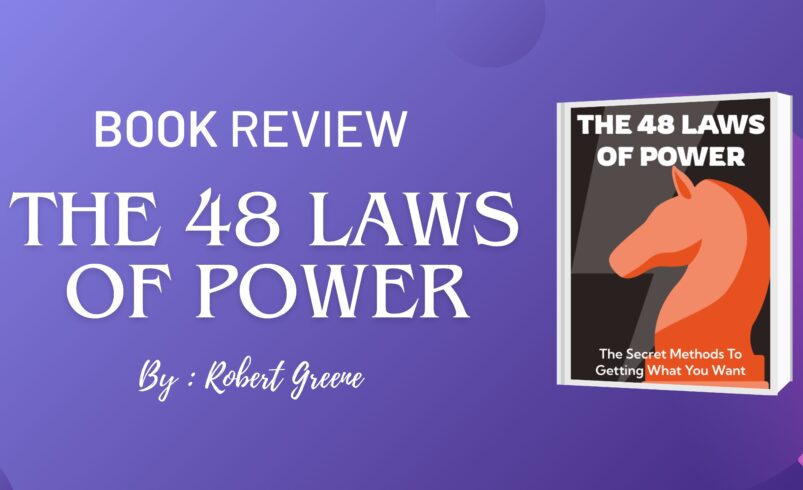
Explore the complex and uncomfortable world of power dynamics with Robert Greene’s controversial cult classic, The 48 Laws of Power. Does The 48 Laws of Power offer invaluable insights into the realities of power, or is it little more than a handbook for cultivating narcissism and cruelty? That’s the dilemma we’ll be dealing with in this in-depth review. Strap in, as it’s about to get dark and deeply thought-provoking.
Applauded by devotees as a brilliant and insightful dissection of power dynamics and condemned by critics as a manual for sociopathic manipulation, Greene’s book is no less than a polarising text that has captivated and horrified readers in equal measure. Taking a sharp U-turn from the regular scheme of a self-help genre, this book rather comes up with a Machiavellian philosophy that is as alluring as it is unsettling. Rather than prescribing a path of personal growth and authenticity, Greene’s “laws” offer a clear-eyed, amoral strategy for attaining influence and dominance over others.
Leaving behind the deemed inspirational counsels to “be your true self” or “follow your passion,” Greene lays out a ruthlessly pragmatic playbook for controlling the perceptions of those around you, eliminating any threats to your power, and making others dance to your tune—all while maintaining an appearance of virtue and nobility. It’s a mindset that clashes dramatically with the more compassionate, emotionally intelligent approach that guides an individual to be compassionate, seek human connection, and show vulnerability. Greene sees such things as liabilities that must be carefully controlled in the fight for supremacy.
With laws stating, ‘preach the need for change, but never reform too much at once’ or ‘discover each man’s thumbscrew,’ there comes a corresponding moral hazard—a principle that, if applied without care, could enable the mistreatment of others and the pursuit of selfish ends at any cost. And in a world already grappling with a pandemic of narcissism and zero-sum thinking, do we really need another text that so brazenly celebrates cunning and cold-blooded self-interest? The policy adopted by the book is similar to the aphorism ‘Fake it till you make it, but on steroids. The book brings up an eternal conflict between pragmatism and morality, and Greene makes it abundantly clear that he pursues power regardless of its ethical implications. The danger, of course, lies in the ease with which Greene’s teachings can be twisted and applied in the service of pure self-interest with little regard for the well-being of others. After all, the same skills that allow one to navigate complex political landscapes can also enable the ruthless exploitation of the vulnerable.
And still, there’s an undeniable intellectual depth and historical richness to Greene’s work that differentiates it from the self-help pack. The book is heavily researched, drawing on a wealth of examples from the royal courts of Renaissance Italy to the imperial dynasties of ancient China. This scholarly, almost clinical analysis lends the 48 laws a seductive aura of sophistication and substance. Woven through Greene’s teachings are insights that even the most ardent idealists would be hard-pressed to dismiss. His views on the power of reputation, the value of silence, and the danger of overconfidence all contain kernels of wisdom that could benefit anyone seeking to enhance their influence.

But can one extract the valuable lessons on strategy and human nature without succumbing to the book’s darker Machiavellian philosophy? This is the question readers tackle while reading this book. Ultimately, the answer lies in the reader’s own moral foundation and their vulnerability to highly influential thinking. The 48 Laws can be a thought-provoking, if unsettling, exploration of how power has been wielded throughout history. But those who lack that foundation may find themselves seduced by Greene’s amoral brilliance, to the detriment of their own humanity. It’s a double-edged sword, and one that Greene himself acknowledges. But regardless of one’s ultimate stance, engaging with this text demands a level of moral fortitude and clear-eyed self-awareness.

The 48 Laws of Power
The secret methods to getting what you wantRobert Greene Business 1998
Available in: | |
This persistent fight between the morality and practicality of the book demands a delicate balance of both. And it’s one that each of us must strike for ourselves, lest we become the very types of manipulators and tyrants that Greene so meticulously profiles. In the end, the true mark of power is not how meticulously we can dominate others but how responsibly we choose to wield it.

Ayushi Lathiya
Ayushi Lathiya is currently pursuing engineering in electronics and communication. In the vortex of her imagination, she's strolling around a beach, listening to Taylor Swift and true-crime podcasts. Ayushi's perfect evening is flipping through books and bringing the characters to life in her head.
Recent Posts
- 25 Top Quotes from The 10X Rule to Supercharge Your Ambition
- 10 Books You Must Read to Succeed in Your Career
- 30 Little Tricks for Big Success in Relationships
- 25 Life-Changing Self-Help Books to Read This December: Boost Your Mood and Your Mind
- 25 Amazing Self-Care Tips for December: Wrap Yourself in Joy, Not Stress









